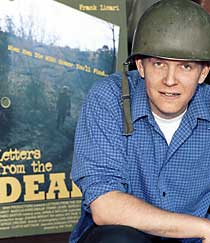When I started out this movie, I had no
gray hairs," notes filmmaker Ari Taub, who now has some
distinct pale tufts around his ears. "One actor put on 30
pounds, another actor went bald, another actor got a suntan,
some older actor got a facelift."
The Brooklyn Heights native spent six years struggling to complete
"Letters from the Dead." The final product may be the
year’s unlikeliest indie: a shoestring-budgeted World War II
combat drama, in German and Italian, made entirely in the northeastern
United States by a Jewish-American director. But something worked
– Taub snagged the Best New Director award at the Brooklyn International
Film Festival, where he premiered the movie on May 3.
Taub, 37, wrote the script with Brazilian collaborator Caio Ribeiro
in 1996, began shooting in 1997 and finished last September.
"I intended to finish it in one year," says Taub. "The
shooting of the movie took, like, three months [total]. But because
I was only able to get enough money for a week here, and two
weeks there, and three weeks there, it had to be broken up."
With a final price tag of less than a million dollars, the movie
is obviously unable to compete with a "Saving Private Ryan"
in spectacle or combat verisimilitude, despite the extensive
participation of World War II re-enactors. Taub instead emphasizes
the day-to-day lives of his soldier characters. Even more notably,
those soldiers are the enemy: the film is seen through the eyes
of a doomed German unit and their ragtag Italian partners in
late 1944, when the Axis was already well down the long slope
to defeat.
Taub used locations in upstate Harriman State Park, Massachusetts
and Connecticut to stand in for the forests of northern Italy.
Indoor scenes were shot on sets built out of Styrofoam at Context
Studios in Williamsburg. More than a dozen German and Italian
actors were flown in, repeatedly, as funds became available.
They were housed in Taub’s Williamsburg loft/office, where he
toils at his day job running a film equipment rental company.
"I had cots and mats and all sorts of things," he said.
"It was like an army camp."
Remarkably, the actors worked for free.
Universal language
"It’s a dream," explains Taub. "A lot of these
guys see Hollywood movies and they imagine they want to do stuff
here I [also] have a lot of Italian and German actors who are
here, and they can’t get decent parts in American films because
they have an accent. It was like a moth to a flashlight. They
knew I would appreciate them for who they are. I let them speak
in their own tongue.
"They found that the way that I work is very different from
the way directors from their own countries work The Germans said
that a [typical] German director doesn’t really care about the
emotion or what the actor’s doing," he says. "’Uh,
move your finger a little bit to the left. Good. Now do it again
and louder.’ That’s the direction they would get, typically I
asked them to ’do it for me first the way that it feels for you.’"
Taub’s collaborative approach to building characters was a breath
of fresh air for his cast. He credits this with much of their
willingness to return again and again and to soldier with him
through the obstacle course of virtually no-budget filmmaking.
The director speaks little Italian or German, but found this
wasn’t a daunting hurdle to directing dialogue in those languages.
"You learn to communicate through your eyes," he says.
"You don’t understand what they’re saying to you, but you
can see what they’re saying, you can see the emotion through
them.
"When I work with the American actors, that skill doesn’t
work. I understand what they’re saying, so suddenly it’s like
having a fog put up. You’re listening to what they’re saying
and then you’re not paying attention to the emotion, so it’s
a much harder thing to do."
The sequel
"Letters from the Dead" is just the first half of a
two-part saga. An as-yet-untitled second film, penned by British
writer Nick Day, will narrate events from the point of view of
the opposing American unit, who in "Letters" are only
occasionally seen before the climactic battle.
Taub shot the American footage at the same time and is editing
now, with vague notions of a July 4 premiere.
"I want to show you two stories that end up in the same
place, but that come from two totally different directions,"
he says, "because the enemies of one story are the heroes
of another story."
He plans to cut together a one-film version, with hopes of eventual
DVD and video distribution. But splitting the two halves is a
practical necessity for the moment.
"My name isn’t Ari Spielberg yet. When you submit a film
to a festival: ’What, two and a half hours, three hours?’ Unless
you’re established, you can’t really be doing that kind of thing."
Such ambition seems to come naturally to the New York University
film school graduate.
Taub recalls hearing, "’You can’t do a war film!’ ’What
are you, insane?’ Those were the first remarks. So I said, ’I’ll
show you’ Even when I was a student, people said, ’You can’t
do this,’ ’You can’t do that.’ And I always did it. I even did
a World War II film on a submarine as a student."
Axis of empathy
Other, different challenges were inherent in the film’s content:
a story that attempts to create empathy with enemy soldiers from
two fascist regimes. Taub admits to exploiting the audience’s
natural sympathy for underdogs, emphasizing the desperation of
the outgunned Axis soldiers and their simple desire to survive
long enough to see home. But sights like an Iron Cross medal
with a swastika or the Hitler salute occasionally jar the viewer
out of too-easy identification.
"The moments to remind you that they’re Nazis were put in
deliberately, obviously, because I don’t want people to forget
who you’re watching," he says. "I didn’t want to do
it in some dishonest way. I wasn’t trying to rewrite history
or anything like that. I was just trying to show that you can
have sympathy for these guys."
One of the festival judges took some convincing, says Taub.
"He was Jewish and he knows that I’m Jewish. He asked me,
’How could a Jew make a film like this? What kind of Jew are
you?’ When he found out that I had an American side to this thing,
he felt differently," Taub recalls.
Still, he is sensitive of the delicate balance he has struck
and is considering some further editing to the climax of "Letters
from the Dead." He feels that certain subtle cues during
the final showdown may be unintentionally slighting to the American
soldiers.
"I’m going to make some small adjustment, because I think
that it’s pushing the button just a little too hard. I’m not
trying to make an anti-American film here," says Taub.
"I believe a lot of people died innocently in the war whether
they were American, German or Italian or whatever. They just
happened to be caught up in something that was much larger than
them."
More information on "Letters from
the Dead" can be found at the Brooklyn International Film
Festival Web site. Log on to www.wbff.org
and click on "2003 Films."

























